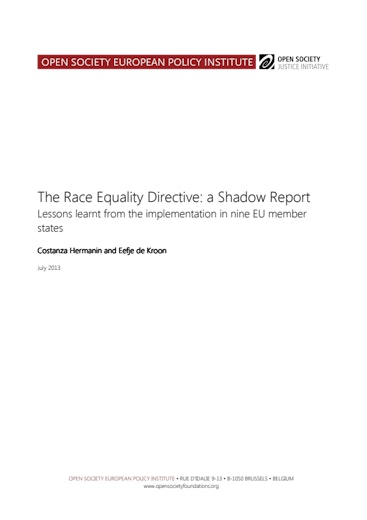The Race Equality Directive: A Shadow Report collects lessons learned from the implementation of the Race Equality Directive in nine European Union member states.
The Race Equality Directive is a piece of legislation adopted in 2000 by the Council of Ministers of the European Union implementing the principle of equality for all irrespective of racial or ethnic origin. The directive comes under review at the end of 2013, 10 years after its entry into force.
The report includes data on Bulgaria, the Czech Republic, France, Germany, Greece, Hungary, Italy, the Netherlands, and Spain. Annex I contains summaries of developments in each of these member states.
The report identifies trends in the challenges facing the countries examined, examples of successful or problematic implementation, and includes recommendations for improving effective implementation.
Challenges to the implementation of the Race Equality Directive include:
- lack of disaggregated data needed to implement parts of this legislation and evaluate its effectiveness;
- unclear identification of proxy categories that can be used to detect discrimination on the ground of racial and ethnic origin;
- problems that impede effective access to and use of judicial (individual or collective) redress against discrimination;
- hindrances to alternative forms of individual (or collective) redress, through the equality bodies.
Analysis is based on two sources of data: country reports by specialized international monitoring bodies (excerpts of these are contained in Annex II) and data generated through a short questionnaire (in Annex III) completed by independent experts and subject matter experts within the Open Society Foundations.
Download
-
The Race Equality Directive: A Shadow Report (528.78 Kb pdf file)
Download the complete 29-page publication.
-
Annex I: Country Summaries (305.03 Kb pdf file)
Download the complete 52-page document.
-
Annex II & III (906.37 Kb pdf file)
Download the complete 169-page document.
Read more
Resilience in Moldova
Q&A: Moldova’s Path to a European Future

Moldova has endured the Kremlin’s aggression because it has chosen to leave Russia's sphere of influence and supports Ukraine. The impact of the war on daily life—and why the nation is determined to join the EU.
Rethinking the EU
In an Age of Crisis, an Opportunity to Remake the EU

From climate change to rising authoritarianism, Europe is facing a range of crises that threaten the way we live. The EU must seize the opportunity to reshape how it works and rethink what role it plays in a changing world.
Corporate Responsibility
Q&A: Why (Some) Investors Want More Regulation

As the EU works on rules to protect worker rights and the planet from corporate harm, Open Society’s Jon Jacoby spoke to Anita Dorett, of the Investor Alliance for Human Rights, about how investors are pushing for change.
